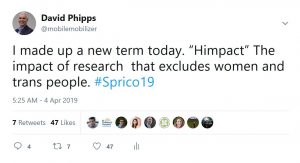I was in Bilbao, Spain recently teaching in a course titled “Implementing a National Health Research Strategy” and one session raised ethical considerations of research impacts. Grimpacts were mentioned and I invented a new term, “himpact”: the impact of research that excludes women and trans people.
Disponible en français
I think we are all comfortable with the concept of research impact. As published by Emerald Publishing and defined by Julie Bayley (@JulieEBayley) research impact is “the provable effects of research in the real world”.

But have you heard of grimpacts (I think it comes from the combination of grim and impact)? Gemma Derrick (Lancaster University), David Budtz-Peterson (Aalborg University) and colleagues presented their concept of grimpactsat the 23rdInternational Conference on Science and Technology Indicators September 12-14, 2018 in Leiden, NL. Grimpacts are the negative impacts of research. They described three cases of grimpacts to illustrate the concept:
- In 1998 The Lancet published a paper by Wakefield and colleagues which implied a link between the measles, mumps and rubella (MMR) vaccine and a “new syndrome” of autism and bowel disease. The paper has since been discredited, withdrawn and all authors except the lead author have retracted their support of the findings
- The Cambridge Analytica scandal which involved an app created by university professors called “thisiyourdigitallife” in 2014, to enable participation in academic research. Facebook allowed the app to collect data not only on consenting participants but on their on-line friends and followers who did not consent.
- Economic Theory and the 2008 Financial Crisis, while not a direct result of research, was in part a result of academic economists not disclosing corporate relationships with financial institutions while failing to draw attention to the impending financial crisis.
The paper proceeds to review commonalities of grimpacts, but what I think it does is raise an important ethical lens on research impact, something that is lacking in all the hype and pursuit of otherwise positive impacts of research.
Continuing on the critique of impact and how it is currently construed and practiced (acknowledging I am actively promoting impact both at York University as well as in Research Impact Canada) I coined the term “himpact” during a session which Claire Donovan (Brunel University) led at the “Implementing a National Health Research Strategy” course. While we have yet to do a literature search and develop a formal critique of impact using the concept of himpact, it is reasonable to extrapolate from the well-established dominance of male subjects in research to the impacts of that male dominated research. Others have reported on the under representation of women in scientific research and this critique goes back to at least 1992.
These impacts of male dominated research can be called himpacts.
Whether or not himpactsexist isn’t the point (yet). The point is that there remains a dominant discourse that impacts of research are positive. Grimpacts began to unpack this discourse in late 2018 and himpactscontinue that critique. Too infrequently do we consider ethical implications of the research impact agenda beyond critiques of the changing nature of scholarship and the impact that has on (particularly early career) researchers and on how research institutions are assessed.
One approach to addressing the ethics of impact is being undertaken by Research Impact Canada practitioners from York U., U Saskatchewan and U. Victoria. They are developing an indigenous framework for knowledge mobilization. At York U, Michael Johnny (Manager, Knowledge Mobilization) has spoken to the Ontario Coalition of Indigenous Friendship Centres about this effort. The indigenous framework isn’t ready for prime time, but it is an important effort to challenge some dominant paradigms in knowledge mobilization and research impact.